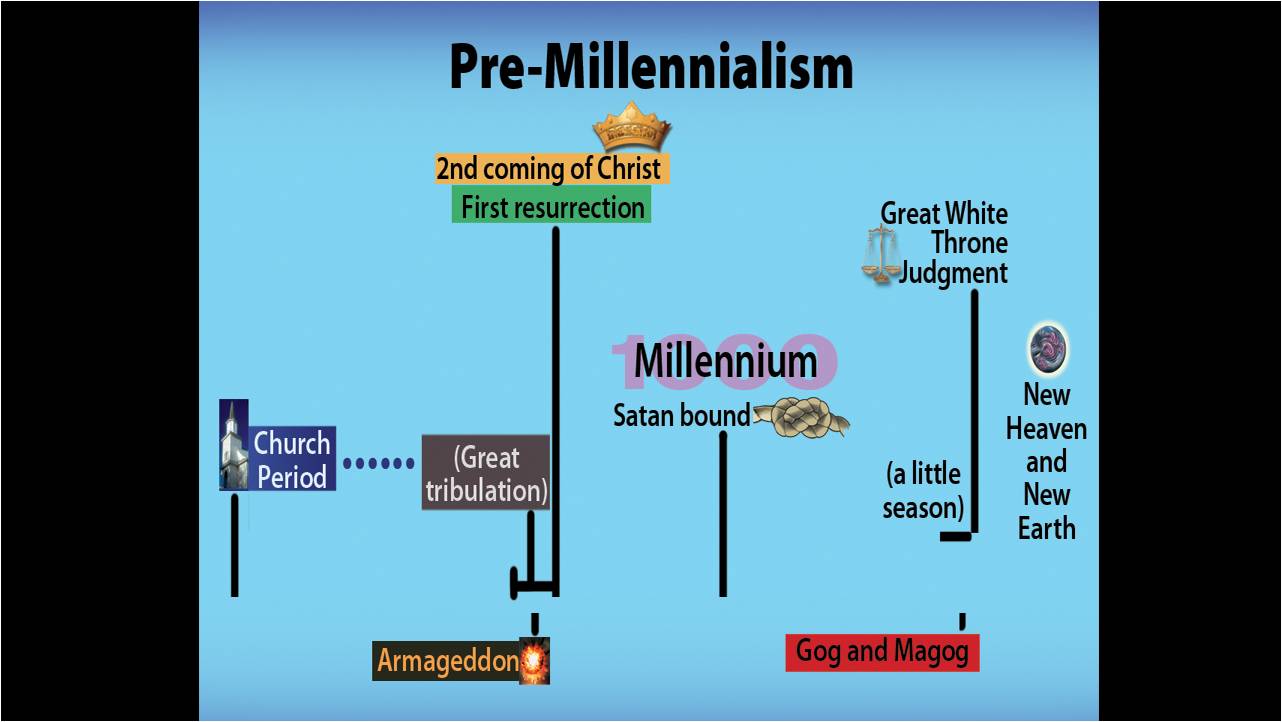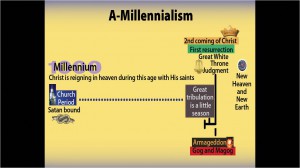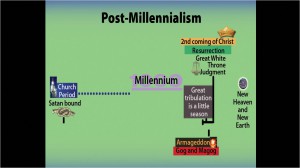by Rev. Mark Robinson
As I sat in the office of the Minister of Evangelism of one of the largest and best known churches in the United States the discussion turned to the Millennium. When asked what he believed he responded, “I am a pro-pan-mill.” Initially, I was confused by his statement. Then it dawned on me. He was saying he was “for whatever millennium view comes to pass.”
Perhaps he thought he was being cute, or didn’t want to enter into theological debate, knowing I and my companion were solidly pre-millennial in our belief. Regardless of his reason, is the issue of the coming kingdom of God of such little consequence as to dismiss it with a flippant statement?
The issue of the Millennial Kingdom is of no little importance. Of the three positions – A-millennialism, Post-millennialism, and Pre-millennialism – only one can be correct. Don’t dismiss this issue as one that only belongs in the “ivory towers” of scholastic debate. Your biblical position on this subject will have a major impact on your understanding of the Bible as well as how you live your life.
It is my conviction that the correct view is the Pre-millennial view. The other two views lead to biblical confusion, at times unbiblical practices, and a denial of the revealed Word of God.
Millennial Kingdom
Millennial comes from the two Latin words “mille” (1,000) and “annus” (years). It speaks of a 1,000 year period of time. Only one passage in the Bible, Revelation 20:1-7, gives us the length of time of the Kingdom (emphasis added).
And I saw an angel come down from heaven, having the key of the bottomless pit and a great chain in his hand. And he laid hold on the dragon, that old serpent, which is the Devil, and Satan, and bound him a thousand years, And cast him into the bottomless pit, and shut him up, and set a seal upon him, that he should deceive the nations no more, till the thousand years should be fulfilled: and after that he must be loosed a little season. And I saw thrones, and they sat upon them, and judgment was given unto them: and I saw the souls of them that were beheaded for the witness of Jesus, and for the word of God, and which had not worshipped the beast, neither his image, neither had received his mark upon their foreheads, or in their hands; and they lived and reigned with Christ a thousand years. But the rest of the dead lived not again until the thousand years were finished. This is the first resurrection. Blessed and holy is he that hath part in the first resurrection: on such the second death hath no power, but they shall be priests of God and of Christ, and shall reign with him a thousand years. And when the thousand years are expired, Satan shall be loosed out of his prison,
In these seven verses thousand years is used six times. This passage seems to be straight forward and easily understood. A child would have no difficulty understanding that the period of time being spoken of here is 1,000 years, not an unknown length of time, but an actual 1,000 year, 365 days to a year, time period. Why then the different views on this passage?
A-millennialism
The prefix “A” means “no.” Those who hold to the A-millennial position say there is no future thousand year kingdom. They believe there is no 1,000 year period, but an unknown length of time where the world will continue to have manifestations of good and evil. The present church age is the “millennial” period (not a literal thousand years). Some hold that the millennium is realized now on earth (e.g. Augustine). Others hold that the millennium is being experienced now by the saints in heaven (e.g. Benjamin Warfield). Some prefer the title “realized millennialism” (e.g. Jay Adams, Anthony Hoekema) in that saints are experiencing the millennium in heaven now until Jesus returns.
Christ will come again literally and bodily. When He comes He will not institute a kingdom on earth, but will usher in the eternal state. The Old Testament promises of a return of Israel to the land and a kingdom centered in Jerusalem are interpreted as spiritually fulfilled in the church today.
The following chart illustrates the A-millennial belief. Jesus is reigning now in heaven with His saints; Satan is bound during this time so as to not prevent the gospel going to all the nations; there will be a short period of great tribulation just before Jesus returns to set up the eternal kingdom (heaven).
Post-millennialism
“Post” means after. Hence, Post-millennialism means after 1,000 years. Those holding this view believe Jesus will return after society has been Christianized by the church’s preaching of the gospel. Christ will come after (“post”) the kingdom has been established. The thousand years of Revelation 20 are not taken literally. They are an undetermined period of time. The Church Age and the Millennium is the same thing. It may take thousands of years, but ultimately the church will bring peace and righteousness to the world.
Evangelical postmillennialists (e.g. Loraine Boettner) should be distinguished from the liberal theological view which teaches that a utopia would be created on earth through human achievement and betterment. Popular in the 19th century, post-millennialism was dealt a severe blow by the First World War and, seemingly, a death blow by the Second World War.
In 1961 Charles Feinberg wrote his updated and enlarged work “Premillennialism or Amillennialism?” He stated that postmillennialism was “practically defunct.” In the “Foreword to the First Edition” Dr. Lewis Sperry Chafer said, “…postmillennialism is dead.”
Satan doesn’t allow false teaching to die so easily though. A modern “revival” of Postmillennialism is espoused by the advocates of “dominion theology” or “Reconstructionism.” Men such as Rousas J. Rushdoony, Gary North, Greg Bahnsen, and David Chilton have been some of the proponents of this view. They hold that government should enforce Old Testament laws and penalties, thus “infusing” society with “righteousness,” along with the preaching of the gospel.
This is a new twist on the evangelical understanding of Post-millennialism. In the past the kingdom would be brought in by the preaching of the gospel. This new form believes the preaching of the gospel is coupled with political activism to establish Christ’s kingdom throughout the world.
There is actually little difference in A-millennialsim and Post-Millennialism. David Chilton, a leading advocate of Reconstructionism, died in 1997, but wrote a number of books on Post-millennialism. He said, “What I am saying is this: Amillennialism and Postmillennialism are the same thing. The only fundamental difference is that ‘postmills’ believe the world will be converted, and ‘amils’ don’t. Otherwise, I’m an amil.”1 If you compare the chart of Post-millennialism with that of A-millennialism you will notice there is essentially no difference in the views. One believes the Church Age and the Millennium are taking place now, and the other believes the Church age culminates in the Millennium when the Church has made the world “Christian.” Both views end with a little time of Tribulation before Jesus returns and the eternal state is established.
Pre-millennialism
Pre-millennialism teaches that Jesus will return before (“pre”) the 1,000 year kingdom is established on earth. The Old Testament promises to Abraham and David are unconditional and will have a literal fulfillment. These promises to Israel have not been fulfilled by the Church, which is a distinct body in this age.
At the close of this age, Christ will rapture his saints and a seven year period of tribulation will precede His return to earth. He then will establish His kingdom on earth for 1,000 years during which time the promises to Israel will be fulfilled.
It is generally agreed that Pre-millennialism was the view held by virtually all church fathers during the first two – three centuries of the church. Augustine (5th century) first articulated the A-millennial view, while Post-millennialism was first articulated as a distinct millennial view by Daniel Whitby around 1700 A.D.
There are a number of reasons to embrace Pre-millennialism as the correct biblical teaching. Here are a few.
First, when one uses a “literal” or “normal” method of interpreting Scripture, the reader will come away with the understanding that there is a one thousand year kingdom on earth after Jesus returns. A “literal” or “normal” interpretation means any passage is to be understood in its historical context and its grammar and word usage. David Cooper’s Golden Rule of Interpretation is still a helpful guide to interpretation.
“When the plain sense of Scripture makes common sense, seek no other sense; therefore, take every word at its primary, ordinary, usual, literal meaning unless the facts of the immediate context, studied in the light of related passages and axiomatic truths, indicate clearly otherwise.”2
All evangelicals use a “literal” or “normal” interpretation when interpreting the Bible except in eschatology (future prophecy). The Pre-millennial belief comes from the consistent application of this method in all areas of biblical interpretation.
Although we are focusing on Rev. 20:1-6 in our consideration of the 1,000 year kingdom, the “normal” method of interpreting the Bible will yield a multitude of passages concerning this period. Henry Thiessen stated it this way. “When once we adopt the view that the Bible means what it says, and that it should be interpreted literally, we find ourselves overwhelmed with material concerning the future [kingdom].”3
A second reason why the Pre-millennial understanding is correct is the prior understanding of prophecy and how it was fulfilled. Prophecies concerning the first coming of Messiah were fulfilled literally. There are prophecies of Messiah being born in Bethlehem (Micah 5:2), of a virgin (Isaiah 7:14), before the destruction of the second Temple (Daniel 9:24-26), being crucified (Psalm 22) and scores of others. Israel being destroyed after the coming of Jesus (Daniel 9:26) and the Jewish people being scattered throughout the world (Deuteronomy 28:64) were fulfilled literally. If the prophecies that have already been fulfilled were fulfilled literally as written, it is logical and consistent to expect future prophecies to be fulfilled just as they are written.
A third reason for Pre-millennial belief is the host of Old Testament prophecies that make no sense without a Pre-millennial understanding of the Word of God. The Abrahamic Covenant (Genesis 12:1-3) as well as other covenants promised to Israel (the Davidic – 2 Samuel 7:12-16; the Land – Deuteronomy 30:1-6; and New – Jeremiah 31:31-34) mean nothing without a Pre-millennial understanding. David Larsen made the point, “The whole bulk of Old Testament prophecy points to the establishment of a kingdom of peace upon earth when the law will go forth from Mount Zion (Isaiah 2:1-4; Micah 4:2-5).”4
The following chart should help put Pre-millennial belief in perspective for the reader. After the Church Age, Jesus returns (after the seven year period of Tribulation) and sets up the 1,000 year kingdom on earth, followed by the establishment of the Eternal state. The timing of the Rapture, which I and this mission believe is Pre-Tribulation, is not referenced on the chart because the issue is the Millennium, and the timing of the Rapture has no influence on accepting Pre-Millennialism as the correct biblical position.
Conclusion
If one embraces either A-millennialism or Post-millennialism, the Bible, at least in the area of future prophecy, becomes unintelligible, confusing, and, even erroneous. A consistent hermeneutic (interpretation of the Bible), church history, and hundreds of Old Testament prophecies demand we embrace Pre-millennialism as the Biblical position and all other millennial positions as heretical.
Endnotes
1. Quoted in H. Wayne House & Thomas Ice, Dominion Theology: Blessing or Curse, Multnomah Press, 1988, page 196
2. Biblical Research Studies Group Website, http://www.biblicalresearch.info/page47.html
3. Henry C. Thiessen, Introductory Lectures in Systematic Theology, page 510
4. David Larsen, Jews, Gentiles, & the Church, Discovery House Publishers, 1995, pages 310-311




